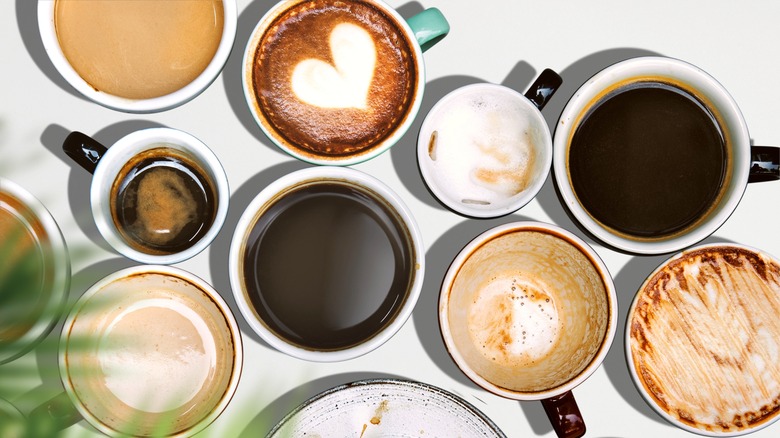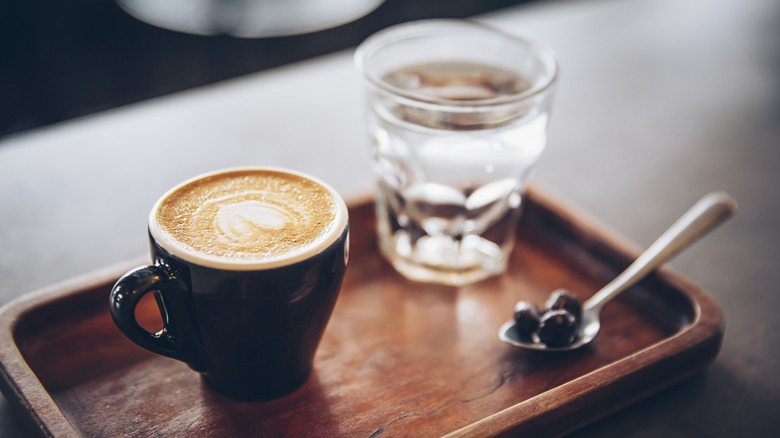Why Coffee Might Backfire And Make You Feel Sleepy
We may receive a commission on purchases made from links.
When we reach for caffeinated drinks, it's usually to help us wake up, stay alert, or give us temporary energy. The world's love affair with coffee has extended to all kinds of specialty drinks, from the sweetest Starbucks Frappuccinos to this Peet's Sun Catcher light roast ground coffee on Amazon. Typically, we reach for that morning cup of joe to help us start our day, with Americans alone drinking more than 400 million cups per day. That's a lot of java. But if you've ever experienced the great caffeine backfire — the sudden feeling of sleepiness despite having your morning cup or two — all of these positive effects are for naught. There are a few reasons why it happens.
Dehydration is the most common culprit. The caffeine in coffee is a great eye-opener, but it's also a diuretic. The water lost through urinating can dehydrate you, slowing your blood flow and reducing your body's oxygen levels as a result. This can cause you to become sleepy or sluggish. In addition, the same caffeine that's a stimulant in your coffee also blocks a neurotransmitter called adenosine. This neurotransmitter is responsible for feelings of sleepiness.
While the adenosine is being blocked, you feel alert. But it's still building up in your body, and when the caffeine begins to wear off, the adenosine kicks in. The third reason you may experience sleepiness after coffee is that you're having an old-fashioned sugar crash. If you like your coffee sweet, or you're loading up on syrup-based coffeehouse drinks, you're probably getting more sugar and less caffeine. Fortunately, there are some ways to minimize these crashes and maximize the effects of your coffee intake.
How to prevent sleepiness from a caffeine crash
The best way to avoid dehydration when drinking coffee is to back it with plenty of water. An easy way to do this is to keep a reusable water bottle nearby and reach for it after you finish your coffee. Peruse our ranked list of 12 popular insulated water bottles for ideas. Our number one pick, the Yeti Rambler, is available on Amazon in a range of colors. You may find yourself running to the restroom more often, but by drinking more water, you'll dilute the negative effects of the caffeine. You can still get the desired boost of energy or alertness, but water will allow the caffeine to evenly distribute through your system.
You should also be mindful of consuming caffeine in moderation. It's a lot easier to know how coffee will affect you if you determine the amount of caffeine it contains. For example, an 8-ounce cup of coffee contains 95 to 200 milligrams of caffeine. Espresso has more caffeine per volume, but is served in smaller amounts. If you're getting your coffee at a shop, ask the barista about the caffeine content, or check out this list of the 20 drinks at Starbucks with the most caffeine. The U.S. Food and Drug Administration (FDA) suggests limiting your intake to no more than 400 milligrams of caffeine per day.
Lastly, be mindful of the sugar in your coffee. So many of our favorite drinks come in the form of tasty treats. You can enjoy that frappé or mocha, but remember that it's probably loaded with sugar that elevates glucose levels. As those levels drop, a crash is imminent, and so you'll feel sleepy quickly. Try drinking water and eating protein to help counteract the crash. You can also try adding some sugar substitutes for your coffee without having to skip your favorite beverage. Our top pick was maple syrup — grab some 365 by Whole Foods Grade A Organic Maple Syrup on Amazon.

